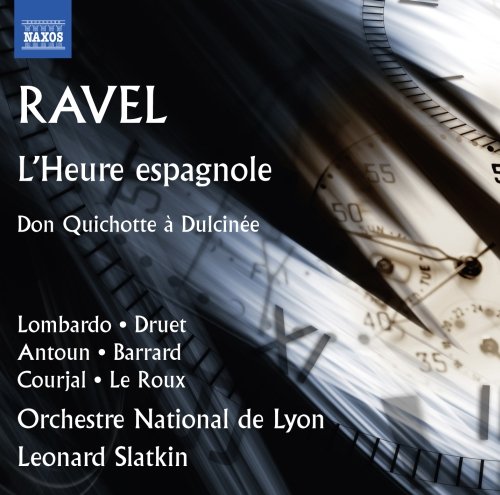RAVEL L’Heure espagnole. Don Quichotte à Dulcinée
View record and artist detailsRecord and Artist Details
Composer or Director: Maurice Ravel
Genre:
Opera
Label: Naxos
Magazine Review Date: 04/2016
Media Format: CD or Download
Media Runtime: 56
Mastering:
DDD
Catalogue Number: 8 660337

Tracks:
| Composition | Artist Credit |
|---|---|
| (L') Heure espagnole |
Maurice Ravel, Composer
Frédéric Antoun, Gonzalve, Tenor Isabelle Druet, Concepcion, Mezzo soprano Leonard Slatkin, Conductor Luca Lombardo, Torquemada, Tenor Lyon National Orchestra Marc Barrard, Ramiro, Baritone Maurice Ravel, Composer Nicolas Courjal, Don Inigo Gomez, Bass |
| Don Quichotte à Dulcinée |
Maurice Ravel, Composer
Leonard Slatkin, Conductor Lyon National Orchestra Maurice Ravel, Composer |
Author: Richard Lawrence
Set in the shop of a clockmaker in 18th-century Toledo, the story is centred on Concepción, who makes use of her husband’s weekly absence to service the municipal clocks (‘the Spanish hour’) to indulge in a little servicing on her own behalf. She turns the initially unwelcome presence of the muscular Ramiro to good account by substituting him for the unsatisfactory Gonzalve and Don Íñigo.
The situation offered Ravel irresistible opportunities for Spanish colour and horological precision, not to mention parody. He instructs the singers to take the recitatives of opera buffa as a model. The vocal writing is certainly syllabic but the debt is as much to Debussy as to Italian opera; it’s interesting to note that the part of Ramiro was written for the same kind of voice (the so-called baryton-Martin) as Pelléas, and both roles were created by the same singer, Jean Périer.
Leonard Slatkin conducts with admirable delicacy, with a nice attention to detail. For instance, the trombone glissandos associated with the would-be lovers leaving their hiding place come across loud and clear, as do the triads when Ramiro tells Torquemada how his watch had saved the life of his uncle in the bullring. Isabelle Druet expresses Concepción’s frustration and impatience so vividly that you almost forget that you can’t see her. Her outburst ‘Oh! La pitoyable aventure!’, seconds before her invitation to Ramiro, is powerfully done; and her earlier remark about her husband’s virility is heavy with scorn. The ever-helpful Ramiro, more brawn than brain, is touchingly sung by Marc Barrard. The entire cast is excellent, in fact, but Frédéric Antoun’s absurd, self-regarding poet deserves a special mention.
Sad to say, Don Quichotte à Dulcinée finds François Le Roux in disappointingly effortful voice. Buy this for the opera; but in honour of the late lamented Denise Duval, and if you have a taste for the very French, saxophony horns of yesteryear, get hold of the André Cluytens recording too.
Discover the world's largest classical music catalogue with Presto Music.

Gramophone Digital Club
- Digital Edition
- Digital Archive
- Reviews Database
- Full website access
From £8.75 / month
Subscribe
Gramophone Full Club
- Print Edition
- Digital Edition
- Digital Archive
- Reviews Database
- Full website access
From £11.00 / month
Subscribe
If you are a library, university or other organisation that would be interested in an institutional subscription to Gramophone please click here for further information.




